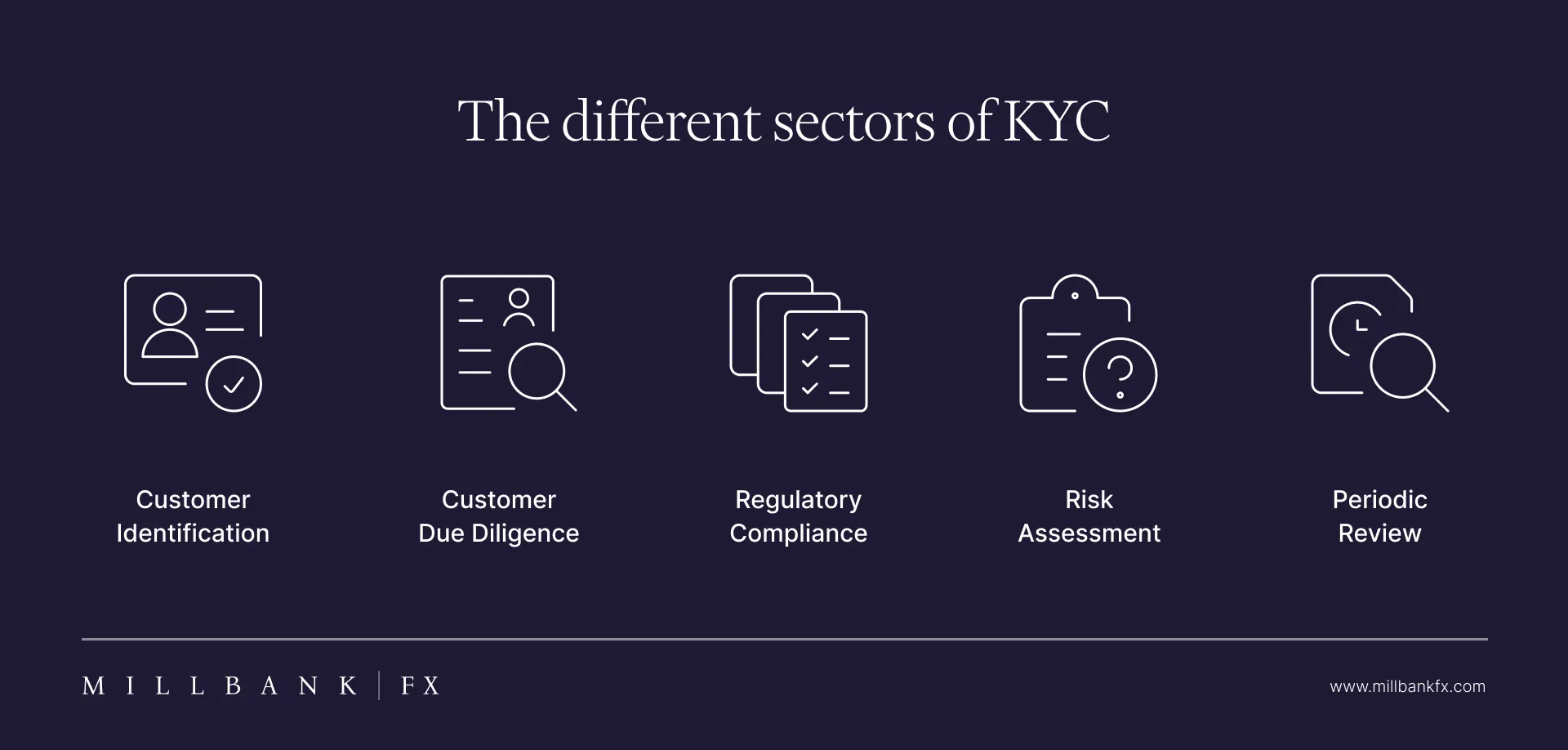なぜKYCは英国の輸入業者にとって重要なのか?
顧客確認(KYC)プロセスは、英国の輸入業者にとって国境を越えた取引において重要ではあるが誤解されがちな要素です。堅固なKYCは規制要件として機能するだけでなく、オンボーディングのスピード、銀行関係、国際決済の全体的な効率性にも直接影響します。電子機器、衣料品、食品、金属、農業などの多様な分野では、KYCは信頼を築き、摩擦のない国境を越えた取引を可能にする上で基本的な役割を果たします。このガイドでは、今日のコンプライアンス環境におけるKYCアプローチの最適化を目指すさまざまな業種の財務リーダー向けに、ベストプラクティスと実践的なアドバイスを概説しています。

KYCとは何ですか?なぜ輸入業者はKYCを必要とするのですか?
KYC(Know Your Customer)とは、英国の金融機関や決済業者がクロスボーダー決済、外貨両替、ヘッジソリューションなどのサービスへのアクセスを許可する前に、ビジネスクライアントの身元と正当性を検証するために実施しなければならない一連のデューディリジェンス手続きです。輸入業者にとって、KYCの遵守が重要となる理由はいくつかあります。
- マネーロンダリングや詐欺の撲滅を目的として、英国当局、銀行、FCA認定プロバイダーが設定した要件を満たしています。
- これにより、取引相手や決済プロバイダーへの信頼が高まり、グローバルな決済ロジスティクスが円滑になります。
- KYCを合理化することで、送金のブロックや口座の凍結による遅延やコスト超過の可能性を減らすことができます。
主なKYC要件
セクターを問わず、輸入業者が新たな金融関係を築く際の一般的な要件には以下が含まれます。
- ビジネス検証 (会社登記簿、有効な会社住所、設立書類)
- 取締役/所有者の識別 (パスポート、運転免許証、または国民ID)
- 資金源の証明 (銀行取引明細書、請求書、契約書)
- 意図された活動の理解 (事業の性質、取引先の国)
セクター間のKYC:実際的な違い
重要な書類は類似していますが、KYCオンボーディングの際に各セクターが独自の課題に直面しています。
- エレクトロニクス 輸入業者は、偽造品やデュアルユース品のリスクがあるため、サプライチェーンの正当性を証明しなければならないことがよくあります。
- 食べ物 セクター輸入業者は、植物検疫書類やサプライヤーの審査証拠など、追加の証明書を頻繁に提出する必要があります。
- 金属 企業は、スクラップの調達や紛争鉱物に関する質問に遭遇する可能性があります。
- 衣類 輸入業者は、工場監査と倫理的なサプライチェーンのトレーサビリティについて尋ねられます。
- 農業 輸入業者は、特に新興市場からの製品については、原産地証明書をより綿密に精査することを期待できます。
輸入業者向けの段階的なKYCオンボーディング
一般的なKYCプロセスを理解することで、ストレスを軽減し、ボトルネックを防ぐことができます。
- 初回申請: 会社情報と、支払い予定額と地域に関する基本情報を提供してください。
- 書類提出: 身分証明書、住所証明、会社登録、および(必要な場合)補足契約のデジタルアップロード。
- デューディリジェンス: プロバイダーは書類を審査し、明確化またはさらなる証拠(特に資金源/富の源泉について)を要求する場合があります。
- リスクアセスメント: PEP(政治的に影響を受けた人物)、制裁、および不利なメディアに対する自動および手動チェック。
- 本人確認書の承認: 簡単なケースでは、満足すれば、通常は数時間以内にアカウントの有効化が完了します。
- 継続的な監視: 特に取引量や取引相手が大幅に変化した場合、プロバイダーは定期的な更新を要求することがあります。
KYCが輸入業者のマージンを保護する方法
一貫性のあるKYCは、コンプライアンスを満たすだけでなく、以下を保証することで利益率を保護します。
- 必要なときに競争力のあるFXソリューションに迅速にアクセスできます。
- サプライヤーへの支払い手続きの煩わしさが軽減され、遅延や遅延ペナルティが回避されます。
- 追加の情報が出るまで資金が保有される可能性が低くなるため、キャッシュフロー管理が円滑になります。
合理化されたKYCプロセスは、輸入業者がマージンを損なう可能性のある出荷遅延や追加の銀行費用のリスクを軽減するのに役立ちます。特に、100万ポンドの注文で2%の通貨変動が20,000ポンドの差につながる可能性があるセクターではそうです。
KYC摩擦の軽減:英国の財務リーダー向けのヒント
- すべての法的文書を最新の状態に保ち、迅速にアクセスできるようにデジタル化してください。
- セクター固有の要件に対応できる、経験豊富な FCA 認定プロバイダーにご相談ください。
- 新しい取引パートナーシップや地域を検討する場合は、早い段階でコンプライアンスチームと連携してください。
- 予想される支払い金額や通常とは異なるアクティビティをアカウントマネージャーに事前に伝えてください。
- サプライヤーに対し、第三者によるデューデリジェンスを合理化するために、追跡可能で検証可能な記録を維持するよう奨励します。
先渡契約などのヘッジ商品を使用する輸入業者にとって、プロバイダーは、基礎となる商業的エクスポージャーや潜在的な担保契約を明確に把握したいと考える場合もあります。
よくある落とし穴とその回避方法
- 不完全な文書: 送信したファイルに、署名、日付、およびすべてのページが記載されていることを確認します。
- クエリへの応答が遅い:オンボーディングの行き詰まりを防ぐため、説明を求めるリクエストには迅速に対応します。
- 古い会社情報: 取締役、株主、または取引先住所に変更があった場合は、プロバイダーに通知してください。
- デューデリジェンスの強化は見込めない: ハイリスクと見なされるセクター(特定の電子機器、金属源、または食品由来)では、追加の証拠が必要になる場合があります。
徹底したKYC:戦略的優位性
包括的なKYCプロセスは、輸入業者をサプライヤーや銀行にとって信頼できるパートナーとして位置づけるだけでなく、サプライヤーにとっても銀行にとっても信頼できるパートナーとして位置付けています。積極的なコンプライアンスにより、新しいFXプロバイダーや決済プロバイダーとのオンボーディング時間が短縮され、キャッシュフローが最適化され、国際的な取引相手との信頼関係が構築されます。

継続的なプロセスとしてのKYC
KYCは一度も完了せず、忘れてしまいます。年次レビュー、取締役または株式保有の異動、取引量やサプライヤーベースの大幅な変化はすべて、新たなチェックのきっかけとなります。財務責任者は、プロバイダーとのオープンな対話を維持し、定期的に最新情報を求めることを想定しておく必要があります。
デジタルKYCと今後の動向
デジタルオンボーディングの台頭により、Millbank FXを含む多くのプロバイダーが、安全なオンラインポータルを通じてKYCプロセスの多くを実現し、事務処理を減らし、承認を迅速に行えるようになりました。将来的には、デジタルKYCのフレームワークが共有され、データ基準が改善されれば、摩擦がさらに減り、業種を超えた輸入業者にとってさらに大きな価値が創出されるでしょう。
成長を妨げずにコンプライアンスを合理化
効率的なKYCは、海外のサプライヤーや通貨を扱う英国の輸入業者にとって不可欠です。輸入業者は、事前に準備を整え、セクターの微妙な違いを理解し、スピードと透明性を優先するプロバイダーと提携することで、利益と評判の両方を守ることができます。




